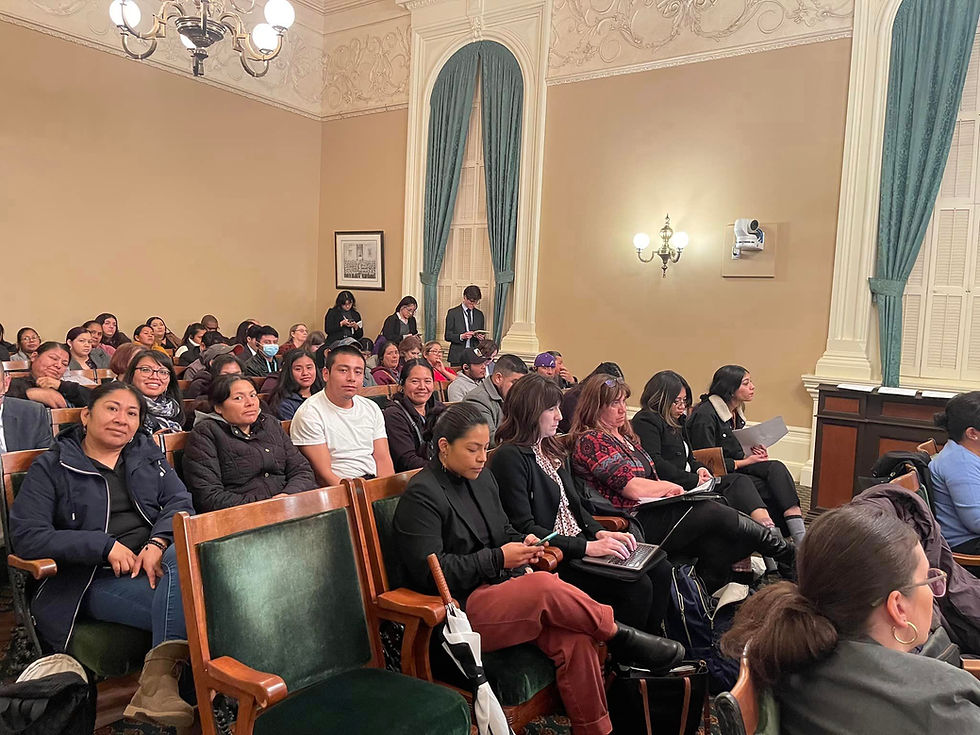State Assembly Labor Committee Hearing: State Agencies Fail to Protect Farmworkers, how can this change?
- Centro Binacional
- Mar 15, 2024
- 3 min read
On February 7, 2024 Centro Binacional para el Desarrollo Indígena Oaxaqueño (CBDIO) attended the Assembly Labor Committee hearing in Sacramento, California. At CBDIO, we reclaim our power and celebrate the labor of farmworkers by organizing to make sure farmworkers are paid fairly and that systems recognize their expertise as valued professionals. CBDIO is proud to have participated in the Assembly Labor Committee hearing that invited expert farmworkers and interest groups to have a voice in public policy for farmworkers. As a voting member of the Farmworker Advocacy working group, we are a group made up of several organizations and unions, that highlights the dangerous working conditions and unfair labor practices that impact California’s agricultural workers, as well as the lack of enforcement from stage agencies. The working group includes collaborators from the central coast and the San Joaquin valley.
The Farmworker advocacy group was created to uplift the voice of workers. At CBDIO we have monthly labor justice meetings with workers where we provide them with information and resources about their worker rights. Here, they voice their concerns about the injustices they go through in their workplace. Because of the issues that are brought up, we as an organization prioritize participating in this hearing to make sure that politicians see and listen to farmworkers' and their concerns. After several months of requesting a hearing with this committee, we come together as one to speak on these issues as well as provide recommendations that will benefit farmworkers in the future. CBDIO invited 11 workers from Fresno and Madera. The workers who participated with CBDIO are active members of our monthly labor justice meetings and encouraged to advocate for themselves. This was an important meeting where farmworkers were able to share the firsthand experience of the issues they see in their workplace as well as learn where laws are made. Many times, farmworkers in California are undocumented and vulnerable to deportation, which makes them scared to speak up about injustices in the workplace. The Farmworker Advocacy group along with workers demands fairness and respect and requests that state agencies uphold their policies and be more inclusive to indigenous farmworkers.

During the hearing, Simitria, a Mixtec indigenous worker had the opportunity to speak and share her experience in her own language of Mixtec. She specifically mentioned wage theft, stating that many companies do not want to pay overtime. In her experience, to avoid paying overtime, employers make people work from Monday to Friday for 40 hours, for which they are paid by check. On weekends they also work, but instead of being paid in check they are paid in cash. This is how many companies try to get out of paying overtime. She also shared that in many workplaces people do not have potable drinking water. Many times, foremen bring tap water that has a bad taste and smell and workers prefer not to drink it. During the hot weather the law says that workers must provide enough shade for the amount of people working. In her experience, foremen tend to have one small shaded space for many people. During the hearing, there was also a presentation from UFCW Western States Council that covered the use of pesticides in the fields, cases of retaliation against workers and the lack of unions. Government agencies such as the California Labor Commissioner's Office and the California Division of Occupational Safety and Health also got to share the efforts they are making for workers. After the committee heard all testimonies, assembly members determined that there needs to be an in-depth review of labor and employment agencies for better protection of farm workers. During the hearing, The Farmworker advocacy working group also coordinated interpretation services for community members who were present, but we emphasize that it is crucial that state government and agencies take into consideration language needs in future state hearings.

The takeaway from this hearing is that the committee representatives listened to our concerns and took the workers' testimonies very seriously. Even though the hearing was a big success, it is important that we hold legislators accountable for the disapproval of current practices, as well as solutions that were presented by the Farmworker advocacy group. For example, the Farmworker advocacy group has been working on an expert navigator pilot program that would allow staff and community organizations to receive health and safety training and certification to conduct field monitoring. There should also be more linguistically available staff in the state agencies when reporting violations in the workplace. We will continue to work with workers to ensure they have the respect they deserve and that state agencies enforce the laws.




Comments